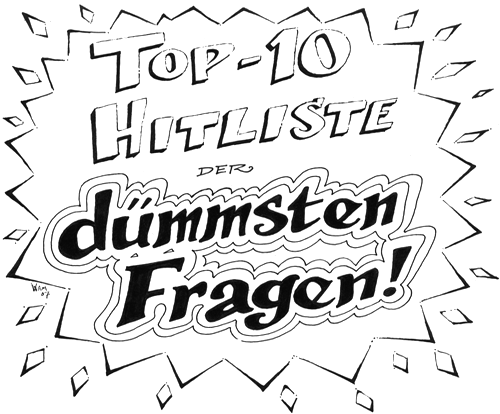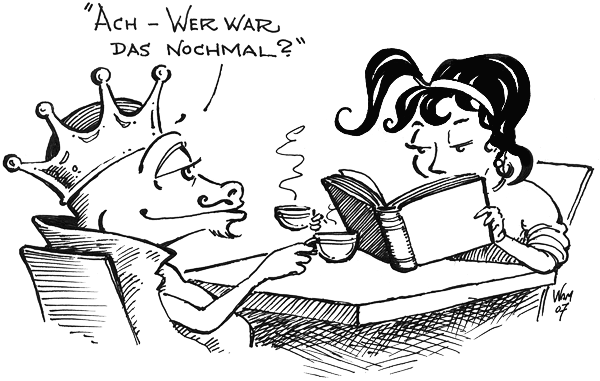4.3.2.5: Interrogatives
- Page ID
- 108119
Conjunctions: Fragen
There are two ways to ask a question, depending on the type of information you need. Whereas a yes/no question is only interested in an either-or answer, the so-called w-questions require a more comprehensive answer (unless they are rhetorical questions, of course ...) as the following top-ten list of stupidest ... ahem ... most fateful fairy tale questions ever asked illustrate!

| 10. | der Vater von Hänsel und Gretel | Was soll aus uns werden? | What should become of us? |
| 9. | die Grossmutter | Wer ist das vor der Tür? | Who is that at the door? |
| 8. | Esel | Woher kann das Licht kommen? | Where could that light be coming from? |
| 7. | die Stiefschwester | Wieso bist du mit Gold bedeckt? | Why are you covered in gold? |
| 6. | der Prinz | Wessen Schuh ist das? | Whose shoe is that? |
| 5. | Rotkäppchen | Großmutter, warum hast du so große Augen? | Why are your eyes so big, Grandmother? |
| 4. | der Wolf | Wohin, wohin kleines Mädchen? | Where to, where to little girl? |
| 3. | die böse Königin | Wer ist die Schönste im ganzen Land? | Who is the prettiest of all? |
| 2. | Dornröschens Vater | Wieviele Teller haben wir nochmal? Nur 12? | How many plates do we have? Only 12? |
| 1. | Rapunzel | Wie kommt das, Frau Grotel, dass der Königssohn so viel leichter ist als Sie? | How come, Frau Grotel, that the prince is so much lighter than you? |
W-question words
The question word in German is at the beginning (they are called W-words because they all start with the letter w], followed by the conjugated verb in second position whether that conjugated verb is a modal verb (e.g., können, sollen) or an auxiliary verb (e.g., hätte, ist, werde).
| Wann? | When? | Wie lange? | How long? | |
| Warum? | Why? | Wie viele? | How many? (count nouns) | |
| Was? | What? | Wieso? | Why? | |
| Wer? | Who? | Wieviel? | How much? (mass nouns) | |
| Weshalb? | Why? | Wo? | Where? | |
| Wessen? | Whose? | Woher? | Where from? | |
| Weswegen? | Why? | Wohin? | Where to? |
Nota Bene: WER and WO are false cognates with the English "who" and "where."
| WER | = | WHO |
| WO | = | WHERE |
| Wer rettet Dornröschen am Ende? | Who saves Sleeping Beauty in the end? |
| Wo findet er die wunderschöne Prinzessin? | Where does he find the wondrously beautiful princess? |
Cases
Welcher and wer have to be declined if they are in the accusative or dative case.
| WELCH- | nominativ | akkusativ | dativ |
| Maskulin | welcher | welchen | (von) welchem |
| Feminin | welche | welche | (von) welcher |
| Neutral | welches | welches | (von) welchem |
| Plural | welche | welche | (von) welchen |
| Welches Märchen hast du am liebsten? | Which fairy tale do you like the best? |
| Mit welchem vergifteten Geschenk tötet die Königin Schneewittchen? | Which poisoned gift does the queen kill Snow White with? (or With which ...) |
| WER | nominativ | akkusativ | dativ |
| Alle Geschlechter | wer | wen | (von) wem |
| Dornröschen | Wer reitet so spät durch Nacht und Wind? | Who is riding so late through night and wind? |
| der Froschkönig | Warte mal, das ist doch gar kein Grimm-Märchen! | Wait a sec, that's not a Grimm Fairy Tale! |
| Dornröschen | Sehr gut. Wen zitiere ich? | Very good. Who am I quoting? |
| der Froschkönig | Ach ... Wer war das nochmal?!? Warte mal, ich weiß es ... Heidrun! Von wem wurde "Der Erlkönig" geschrieben? | Ah ... who was that again?!? Wait a sec, I know this ... Heidrun! Who wrote the poem "The Elf King"? [lit: by whom] |

Indirect questions
You can use all the W-question words in indirect questions as well, most often introduced by the following phrases:
| Ich weiß/Ich weiß nicht ... | I know/I don't know ... |
| Ich habe keine Ahnung ... | I have no clue ... |
| Wer weiß ... | Who knows ... |
| Weißt du ... | Do you know ... |
| Ich kann micht nicht erinnern ... | I can't remember ... |
| Ich habe vergessen ... | I forgot ... |
| Sie haben mich gefragt ... | They asked me ... |
| Ich möchte wissen ... | I would like to know ... |
| Dornröschen | Ich möchte wissen, warum an meinem 15. Geburtstag niemand zu Hause war! | I'd like to know why nobody was at home on my 15th birthday! |
| (Frage: Warum war an meinem 15. Geburtstag niemand zu Hause) | ||
| Aschenputtel | Du weißt nicht, wo sie alle waren? | You don't know where they all were? |
| (Frage: Wo waren sie alle?) | ||
| Dornröschen | Ich frage mich, wieso sie nicht wussten, dass ich an diesem Tag verletzt wurde! | I wonder how come they didn't know that I would be hurt that day! |
| (Frage: Wieso wussten sie nicht, dass ich an diesem Tag verletzt wurde?) | ||


